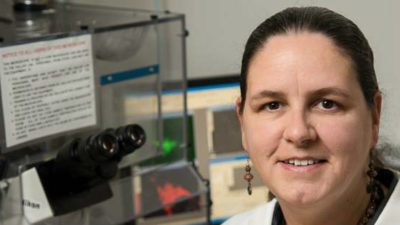The University of Missouri-Kansas City School of Dentistry was awarded a National Institutes of Health grant that may lead to the identification of new approaches to prevent bone loss in diseases such as osteoporosis.
The research is relevant to public health because it investigates a newly discovered mechanism by which bone cells might signal — talk — to each other by releasing small membrane-bound particles called vesicles, which are packed with molecules that alter the behavior of a recipient cell that takes up the vesicles.
By gaining a better understanding of how these vesicles work, we will have a better understanding of how bone mass is maintained, said Sarah Dallas, endowed professor at the UMKC School of Dentistry and principal investigator on the $377,312 two-year grant from the National Institute of Arthritis and Musculoskeletal and Skin Diseases.
“We are excited to have this opportunity for collaboration and to explore this new avenue of research which may pave the way for new therapeutic approaches in the treatment of bone diseases,” Dallas said.
The research team has discovered that a specialized cell in bone — the osteocyte — releases these small vesicles and may use them to control the activity of bone forming and bone resorbing cells and also to amplify responses to signals that promote bone formation or bone resorption.
Co-investigators on the grant are Andrew Keightley, director of the UMKC proteomics core facility and associate professor at the School of Biological Sciences and from the School of Dentistry: Joanna Scott, assistant professor, who will provide statistical support; Yasuyoshi Ueki, associate professor, who will oversee experiments looking at effects of osteocyte extracellular vesicles on osteoclast function; and Lynda Bonewald, professor emeritus, who will oversee some of the experiments in osteocyte cell lines.

